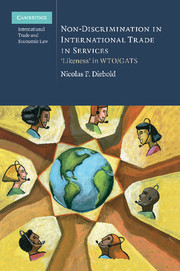Book contents
- Frontmatter
- Contents
- Foreword
- Acknowledgements
- Abbreviations
- List of Cases
- List of Legal Texts
- List of Documents
- Introduction
- PART I Foundations
- PART II Framing the conceptual breadth of ‘likeness’ in GATS
- 5 ‘Likeness’ in national treatment
- 6 ‘Likeness’ in MFN treatment
- 7 Comparative analysis of ‘likeness’
- 8 Concluding summary: economic standard
- PART III GATS specific ‘likeness’ issues
- PART IV Methodology for the ‘likeness’ analysis in GATS
- Bibliography
- Index
6 - ‘Likeness’ in MFN treatment
Published online by Cambridge University Press: 10 January 2011
- Frontmatter
- Contents
- Foreword
- Acknowledgements
- Abbreviations
- List of Cases
- List of Legal Texts
- List of Documents
- Introduction
- PART I Foundations
- PART II Framing the conceptual breadth of ‘likeness’ in GATS
- 5 ‘Likeness’ in national treatment
- 6 ‘Likeness’ in MFN treatment
- 7 Comparative analysis of ‘likeness’
- 8 Concluding summary: economic standard
- PART III GATS specific ‘likeness’ issues
- PART IV Methodology for the ‘likeness’ analysis in GATS
- Bibliography
- Index
Summary
Even though some Members expressed critical remarks with regard to a transposition of the MFN principle from GATT to GATS, it appears from the overall negotiating history that there were in general less concerns than with regard to national treatment. One of the main disagreements arose over the issue of whether the obligation should apply to all services or whether some sectors should be excluded from its scope of application. Moreover, some negotiators opted for an optional MFN obligation, while others viewed MFN as a key in progressive liberalization of trade in services, as it entails that bi- and plurilaterally negotiated concessions are automatically extended to all other Members. Switzerland, for instance, argued that MFN ‘would have to be the corner-stone of the future agreement and [that] it was crucial for small countries’. Yet, while the automatic extension of bi- and plurilateral concessions has proven very effective under GATT for the reduction of tariffs, it is more difficult to identify measures in national regulations on the supply of services which favour one country over another. In spite of these reservations, the negotiators agreed that the multilateral framework on trade in services shall contain a MFN provision. This obligation is implemented in Article II:1 GATS, which states as follows:
‘With respect to any measure covered by this Agreement, each Member shall accord immediately and unconditionally to services and service suppliers of any other Member treatment no less favourable than that it accords to like services and service suppliers of any other country.’
- Type
- Chapter
- Information
- Non-Discrimination in International Trade in Services‘Likeness' in WTO/GATS, pp. 127 - 139Publisher: Cambridge University PressPrint publication year: 2010

